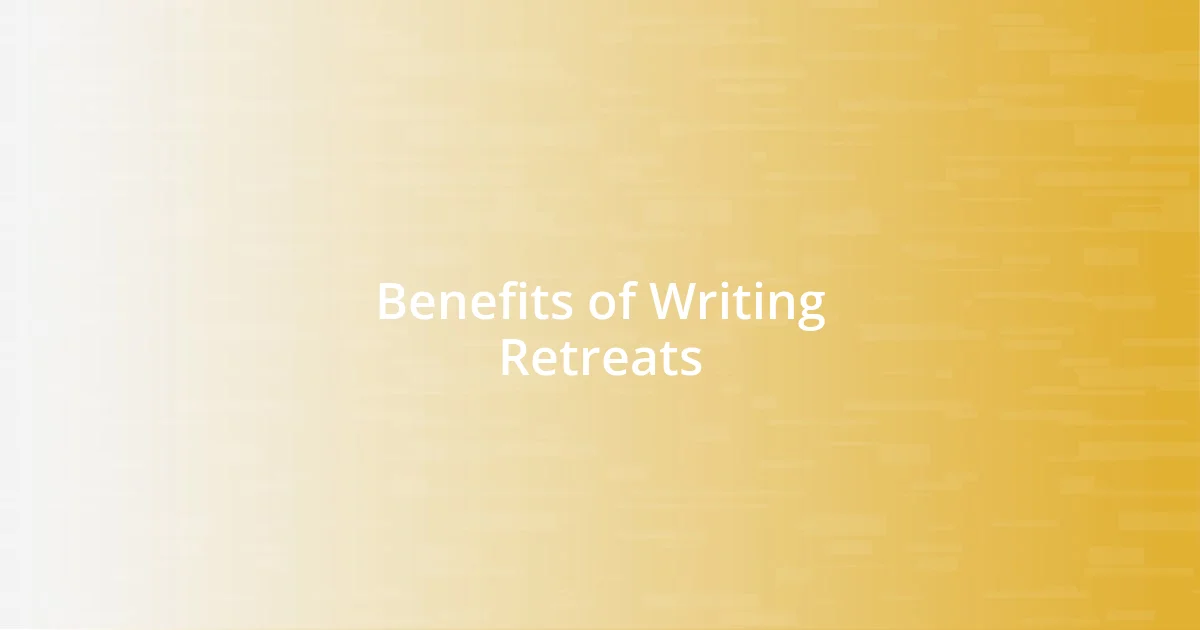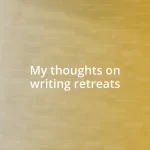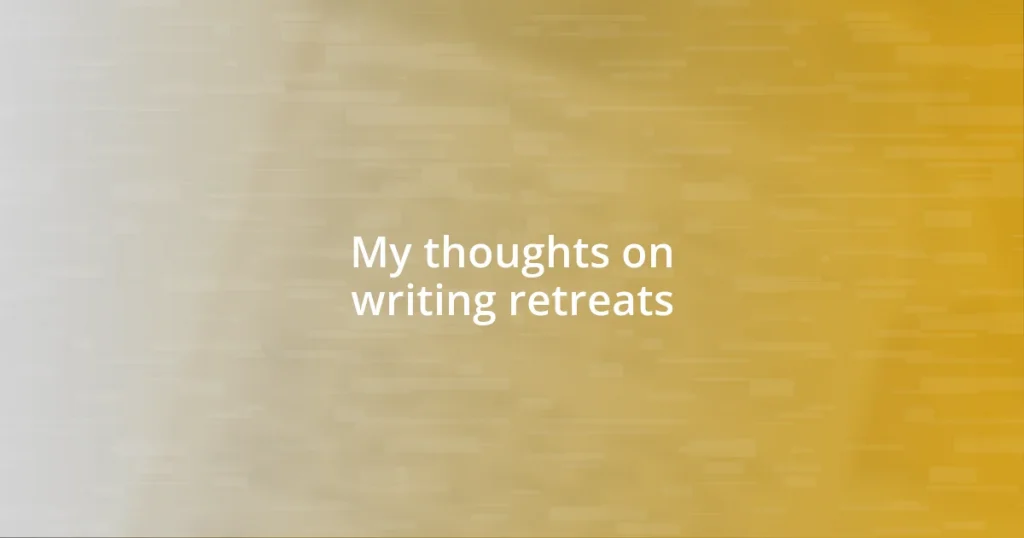Key takeaways:
- Writing retreats enhance creativity by providing an inspiring environment and fostering connections with like-minded individuals, resulting in fresh ideas and valuable feedback.
- Choosing the right retreat requires careful consideration of personal goals, duration, facilitators, group dynamics, and activities to ensure a fulfilling experience.
- Reflecting on the retreat experience through gratitude and insights helps solidify personal growth and informs future writing projects, making the experience impactful beyond the retreat itself.

Benefits of Writing Retreats
Writing retreats offer a unique opportunity to escape the usual distractions and immerse oneself in creativity. When I attended a retreat last summer, I was amazed at how quickly I fell into a productive rhythm. Does being surrounded by like-minded individuals enhance our creativity? Absolutely. The energy in the room, filled with shared passion, pushed me to explore ideas I had previously overlooked.
Another significant benefit is the chance to receive feedback in an encouraging environment. During one session, a fellow writer read a piece aloud, sparking a conversation that opened my eyes to new perspectives. How often do we really get a chance to connect deeply over our work? I believe it’s rare, yet retreats cultivate that connection, allowing each writer to flourish through collaboration and support.
Lastly, the serene settings of many retreats cannot be overstated. Positioned in nature, I found myself inspired by my surroundings — the rustle of trees, the serenity of a nearby lake. Have you ever noticed how a change of scenery can lead to a shift in mindset? I certainly did; it revitalized my writing and allowed for fresh ideas to come flowing onto the page.

Choosing the Right Writing Retreat
Choosing the right writing retreat involves considering various factors that align with your personal goals and style. When I looked for a retreat, I learned that location plays a crucial role. For instance, I was drawn to a peaceful coastal retreat because the sound of waves calms my mind and fuels my creativity. It’s essential to reflect on what environment inspires you the most, whether it’s a serene forest, a bustling city, or a tranquil beach.
Here are some key aspects to consider:
- Focus and Goals: Clarify what you want to achieve. Are you looking to finish a draft or seek inspiration?
- Duration: Consider how much time you can dedicate. Are you up for a weekend or a full week?
- Facilitators: Research the instructors or mentors. Their expertise can shape your experience.
- Group Dynamics: Check if the retreat fosters collaboration or allows for solitary work. Make sure their style resonates with yours.
- Activities Offered: Look for workshops, feedback sessions, or free writing time — each can influence your productivity and enjoyment.
Being mindful about these elements can help ensure you choose a retreat that resonates with your creative spirit, making it a truly impactful experience.

Creating Your Writing Goals
Creating writing goals is an essential part of the writing process and can greatly influence your productivity during a retreat. From my experience, setting specific, achievable goals helps create a focused mindset. For instance, I once aimed to write three chapters during a week-long retreat, and breaking that down into daily targets made it feel attainable. This structure not only kept me motivated but also allowed for flexibility when inspiration struck.
I’ve found that writing goals should resonate with your personal aspirations. During my last retreat, I decided to draft a short story inspired by the local landscape. This goal not only allowed me to explore my creativity but also led to deeper emotional connections with both my writing and my surroundings. I often wonder if writing goals should be purely about productivity, but I believe they should also foster personal growth and exploration.
To give you a clearer idea, here’s a table comparing certain aspects to keep in mind while creating your writing goals:
| Aspect | Description |
|---|---|
| Specificity | Clearly define what you want to accomplish (e.g., complete a chapter). |
| Realism | Align your goals with what’s achievable within the retreat’s timeframe. |
| Flexibility | Allow room for creativity and spontaneous ideas that may emerge. |
| Personal Connection | Ensure your goals resonate with your interests or experiences. |
| Accountability | Share your goals with fellow writers for added motivation and support. |

Maximizing Your Time at Retreats
To truly maximize your time at a writing retreat, I’ve found that creating a structured but flexible daily schedule is essential. On my last retreat, I allocated specific time blocks for writing, workshops, and even some solo reflective walks. Those walks became the highlight of my days; they opened my mind and helped generate fresh ideas. I often ask myself, how can I blend productivity with moments of stillness? The answer has always been in that balance.
Additionally, engaging with fellow attendees can dramatically enhance your experience. I remember one evening when a simple dinner conversation sparked a fantastic idea for my novel. Sharing your struggles and triumphs with others not only builds camaraderie but also provides critical feedback that can refine your work. Have you ever considered the power of community in your writing journey? It can turn a solitary task into a shared adventure filled with inspiration.
Finally, don’t underestimate the importance of self-care during these intensive writing days. I’ve noticed that when I prioritize my well-being—whether that’s enjoying a good book, meditating, or treating myself to a morning coffee—I come back to my writing with renewed energy. It’s all about those little moments that recharge your creativity, right? By weaving self-care into your retreat experience, you’ll be surprised at how much more you can achieve.

Networking and Building Connections
One of the most enriching aspects of writing retreats is the opportunity to network and build connections with fellow writers. I still remember a casual coffee break I had where I struck up a conversation with a poet. What began as small talk about our writing processes evolved into a collaborative project that I hold dear to this day. Have you ever considered how a simple chat can lead to unexpected creative partnerships? It’s moments like these that can expand our horizons.
When you share your work and experiences with others, it fosters a unique sense of community. During a group workshop at one retreat, I was struck by how encouraging feedback can genuinely elevate your writing. I had never thought of my protagonist in the way another writer suggested, which opened up whole new avenues for my story. Isn’t it fascinating how different perspectives can deepen our understanding of our own work?
Additionally, establishing these connections often extends beyond the retreat itself. I still keep in touch with several writers I met at that same retreat, sharing drafts, resources, and motivation long after we’ve parted. These relationships create an invaluable support system that makes the solitary nature of writing feel a little less lonely. So, how do you foster lasting connections when networking? It’s about being genuine, open, and willing to engage with others’ stories as deeply as you share your own.

Reflecting on Your Retreat Experience
Reflecting on your retreat experience is a crucial step in solidifying what you’ve learned and how you’ve grown as a writer. After my last retreat, I took a moment to jot down key insights that resonated with me, such as how vulnerability can spark authenticity in my writing. I’ve sometimes wondered, what if I hadn’t embraced that discomfort of sharing my work? It’s often those uncomfortable moments that lead to the most profound growth.
One of the revelations I had was the importance of gratitude during my retreat. Each evening, I sat down to list three things I was thankful for that day—whether it was a breakthrough in my draft or a meaningful conversation with a fellow writer. This simple practice not only helped me appreciate the journey but also revealed patterns in my writing process that I hadn’t noticed before. Have you ever considered how gratitude can shift your perspective on your creative challenges?
Ultimately, reflecting allows us to translate our experiences into actionable insights for future projects. I recall sitting quietly one morning, sipping tea, and mapping out my next steps based on the feedback I’d received. This act of reflection wasn’t just an end; it was the beginning of a new chapter in my writing journey. How do you plan to incorporate the lessons learned from your retreat into your daily writing habits? Taking the time to reflect can turn fleeting moments into lasting influences that shape your artistic voice.













